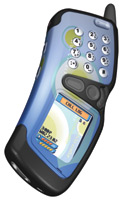Wind River touts Android win, tools
Oct 21, 2008 — by LinuxDevices Staff — from the LinuxDevices Archive — 1 viewsWind River has officially announced plans to offer one of its vertical-market “Platform” products for Android, a commercially supported version of the Android development platform, which it expects to ship before Q3, 2009. Additionally, it says it has already supplied Android-related software integration services to Kyocera.
Wind River likes to boast of having been the “only integration partner” among the OHA founders. Now, it says it provided Kyocera Wireless Corp, a large Japanese consumer electronics vendor, with “software systems integration services inclusive of technologies from other Open Handset Alliance members and third-party partners.”
For its part, Kyocera added that Wind River will provide “middleware and user interface integration, optimization of Android, and custom integration.” The companies did not say when Kyocera might ship an Android phone, however.
Wind River and Kyocera made their announcements in conjunction with today's announcement by the Open Handset Alliance (OHA) that it has posted open-source Android code on a new Google-sponsored Android Open Source Project website. The first Android phone, the HTC G1, is expected to hit retail shelves tomorrow.
Android “Platform”
Additionally, Wind River has announced plans to launch a commercial “Platform” for Android in the first half of 2009. The Platform, or development kit, will combine open-source Android software with Wind River's “commercial-grade” Linux kernel, Android-specific Linux patches, layer-based build system, and automated test framework. It will also include “pre-integrated” third-party technologies, according to Wind River.
 Kyocera's Delta 2, circa 2002 |
Earlier, Wind River demonstrated its Linux kernel on early Android prototype hardware designs from TI, NEC, and STMicroelectronics, suggesting more Android design wins may be in the pipeline for the company. Wind River has also participated in LiMo, an Android competitor supporting native as well as managed application development. To date, most all the LiMo phones we've seen so far have used MontaVista kernels, but Wind River's recent purchase of Linux phone pioneer Mizi Research may help to change that.
In August, Wind River hinted at the Kyocera win when it mentioned that it had been chosen by Kyocera for a “next-generation consortia-based smartphone.” Interestingly, Kyocera was involved in the world's very first Linux phone (the Delta 2, pictured), though it has been quiet in the market since.
Stated Jason Whitmire, Wind River's GM, Mobile segment, “[Android] is compelling to manufacturers and operators because it mitigates the cost and risk associated with open source solutions.”
This article was originally published on LinuxDevices.com and has been donated to the open source community by QuinStreet Inc. Please visit LinuxToday.com for up-to-date news and articles about Linux and open source.